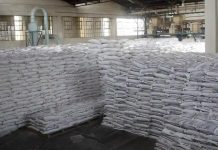Zimbabwean millers have welcomed a recent government decision to scrap import duty on grain products in attempts to improve the availability of basic foodstuffs among starving citizens.
Cabinet last week liberalised the importation of wheat flour, maize grain, maize meal and wheat flour with immediate effect.
The move, authorities say, was “to ensure the continued availability of essential foodstuffs at the market and to counter the effects of drought that was experienced during the 2018- 2019 agricultural season”.
In a brief reacting to the development Monday, Grain Millers Association of Zimbabwe Media and Public Relations Manager Garikai Chaunza said the country’s commercial grain processors were yet to fully analyse the impact of the populist measure on business.
Chaunza admitted the move by authorities showed government’s sensitivity towards the plight of ordinary citizens who have been struggling to put a decent meal on the table.
He said this was proof the country’s leaders were keen on ensuring the continued availability of basic foodstuffs at affordable rates.
The GMAZ spokesperson however said millers were set to hold an extra-ordinary meeting on Grain Strategy, Procurement, Importation and Price Stabilisation, “to thoroughly examine the impact of these pronouncements”.
“The association is, however, holding an extra-ordinary meeting on Grain Strategy, Procurement, importation and price stabilisation, where it will thoroughly examine the impact of these pronouncements.
“The milling sector remains committed to working with the authorities to ensuring food security,” he said.
However, observers still feel government was conflicted in terms of ensuring the nation did not starve at the same time try to protect local industry which has struggled for viability amid a flood of imported goods in the country.
An economic analyst who agreed to speak on condition of anonymity said the government move would likely open up the local market to South African GMOs which Zimbabwean authorities have resisted over the years.
“These are signs of panic from a cornered government that has failed to create a conducive environment for citizens to live decent lives,” he said.
“The whole things smacks of a government that is desperate to appease its restless citizens especially during the current festive season in which bulk sourcing for food products is common among citizens.”
“However,” he added, “I foresee the same government going back on its populist decision the moment we wave goodbye to the festive season because it is apparent that opening up the local market at this stage of our economic lives would upset the local market and decimate jobs.
“This is definitely not in the spirit of promoting local industry as local consumers will go for cheaper imported products.”






